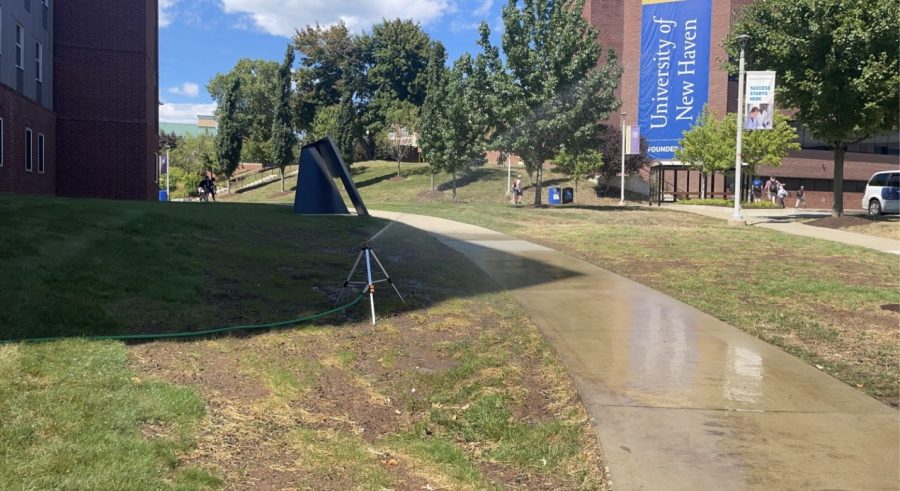Our sprinklers are not contributing to the conservation of water during a state-wide drought
Photo courtesy of Julianna Pegnataro
A sprinkler outside of Celentano Hall, Sept. 1, 2022, West Haven.
During the first week of classes, many students, including myself, noticed peculiar changes that were made across campus.
Due to the abnormally dry weather and little rain recently in Connecticut, grass in many areas of West Haven began to turn yellow, with the exception of the University of New Haven. Students noticed that the grass on campus is nearly as green as it was after the conclusion of the Spring 2022 semester.
Mary Lippa, a senior forensic psychology major, says that she believes the sprinklers on campus are ultimately helping the grass. “I also believe, and know, that there are more non-invasive ways to do it. It makes the sidewalks slippery, gets students and their materials wet, and wastes water much of the time.”
Lippa says that they have had to change their walking route across campus to avoid the invasive sprinklers. “In my experience, I have had to change paths because of the sprinklers taking up so much of the sidewalk. Plus the wind, the water gets carried farther than one would think, which has gotten me soaked.”
The distinction lies in property maintenance on campus differing in comparison to the surrounding areas of West Haven, highlighting the excessive irrigation of land throughout the summer season. A few of the sprinklers at the university, which students could see passing from Main Campus to Harugari Hall, continuously sprays the sidewalk, parking lot, cars and students with water.
Although many people may find humor in the new sprinklers on campus that wash the sidewalks and cars, not many people know that the United States is facing one of the biggest droughts in history.
On Aug. 18, Connecticut Gov. Ned Lamont declared that Connecticut is in a Stage 3 drought in the Southeast Area and a Stage 2 drought in the Southwest areas of Connecticut, including the University of New Haven.
There is also important information to know about lawn maintenance within the university campus and its surrounding areas that is contributing to this issue. Rather than owning pro-native flowers, plants and gardens, lawns, like the ones we have on campus, need much more water in order to sustain themselves compared to pro-native gardens, who don’t require as much nutrition.
Up to 60% of freshwater from aquifers in urban areas are used to maintain lawns by using irrigation systems and sprinklers. With places that are experiencing drought, such as Connecticut this is not a sustainable way to be using our water supply. Lawns within our university also lack ecological value, which means that they lack environmentally beneficial biodiverse species, such as pollinators. Although this may sound unsettling, there are plenty of changes that can even be made within our campus, including altering water usage and increasing advocacy for sustainable resource consumption. One such step could be communicating to our university about how simply turning off the faucets to irrigation and sprinklers for lawns can make a huge difference.
If you are interested in contributing to a better university climate on campus and in New Haven, you can also sign my petition – “U’NewHaven, Turn Off The Sprinklers & Contribute To Saving Our Environment” on Change.it – and share it with others who feel the same way about the sprinklers. The most important thing to do is to educate those around campus about the effects we have on the environment and what we can do to contribute to a more sustainable world moving forward.




